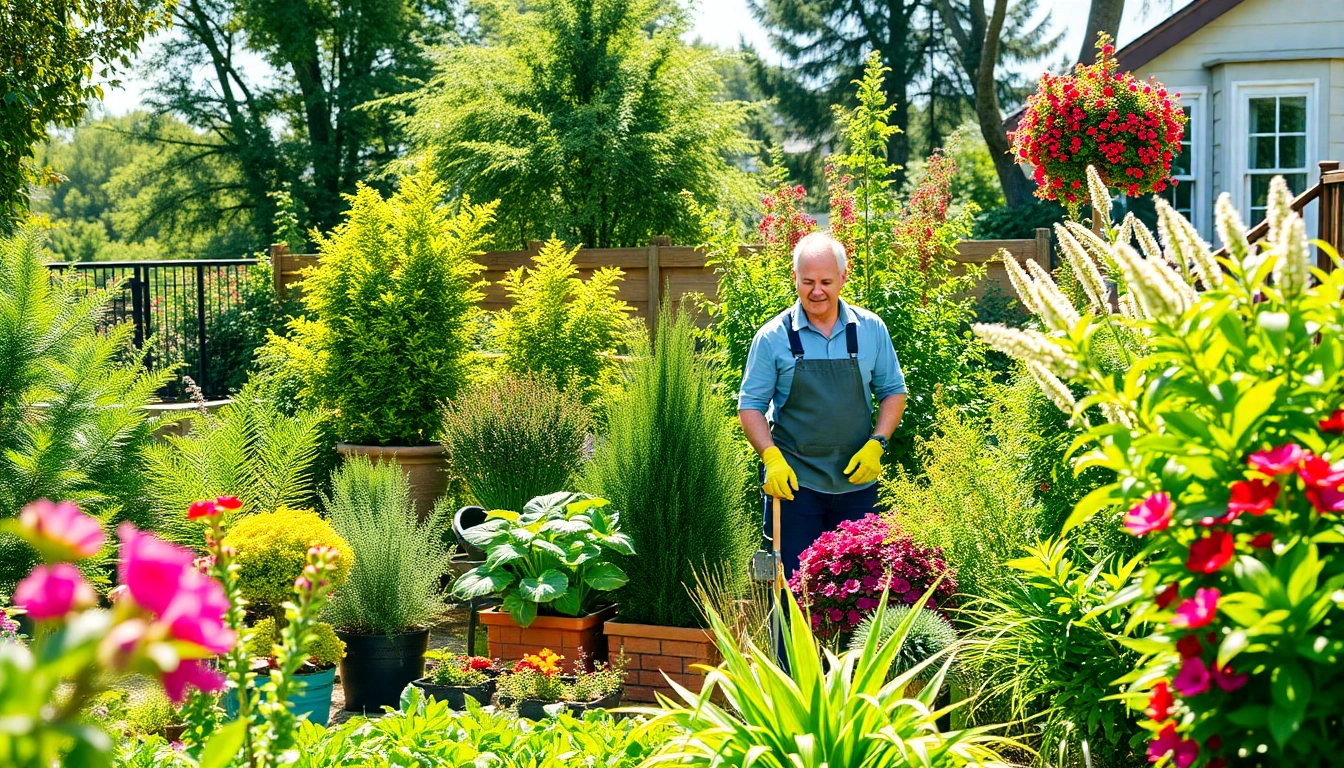Understanding Garden Maintenance Services
What is a Garden Maintenance Service?
A garden maintenance service is a specialized service offered to maintain and enhance the health and aesthetics of gardens and outdoor spaces. These services can range from basic lawn care to comprehensive landscape management, catering to various gardening needs and preferences. By employing expert knowledge and professional tools, these services ensure that gardens thrive, remain free of pest infestations, and look visually appealing throughout the year.
Benefits of Hiring Professionals
Engaging a professional garden maintenance service offers myriad benefits, both for individual homeowners and commercial properties. Here are some key advantages:
- Expert Knowledge: Professionals are trained to understand plant health, soil conditions, and pest management, ensuring that your garden receives the best care possible.
- Time-Saving: Maintaining a garden can be time-consuming. Hiring experts frees up time for homeowners to focus on their daily lives or other important activities.
- Enhanced Aesthetics: Professionals have a keen eye for design and can enhance the visual appeal of your outdoor space using curated plant selections and landscaping techniques.
- Seasonal Preparedness: Garden maintenance services help prepare your garden for seasonal changes, ensuring that necessary tasks such as pruning, fertilizing, and mulching are conducted at the right time.
- Consistent Care: Regular maintenance schedules can be established, providing peace of mind that your garden is being cared for consistently and effectively.
Common Services Included
Garden maintenance services are comprehensive and can include various specific tasks designed to keep gardens looking their best. Common services typically encompass:
- Lawn Care: Mowing, aerating, fertilizing, and overseeding lawns to promote healthy grass growth.
- Plant Care: Pruning, deadheading, dividing perennials, and pest management.
- Weeding: Regular removal of weeds to prevent competition for nutrients and water.
- Soil Health: Improving soil quality through testing, amendments, and proper composting practices.
- Seasonal Cleanups: Removing leaves, debris, and spent plants at the end of seasons to prepare for new growth.
- Irrigation Management: Installing and maintaining irrigation systems to ensure efficient water use within the garden.
Planning Your Garden Maintenance Schedule
Assessing Seasonal Needs
Seasonal changes directly impact plant growth and garden maintenance practices. Assessing seasonal needs is the first step in creating an effective maintenance plan. Different seasons require unique care practices:
- Spring: This is a key season for planting and rejuvenating landscapes. Focus on soil testing, adding compost, planting early bloomers, and frequent weeding.
- Summer: This season is about sustaining growth. Regular watering, pest control, and deadheading flowers are critical.
- Fall: Preparing gardens for winter, including mulching, cutting back perennials, and planting spring bulbs.
- Winter: Protecting plants from frost damage through adequate coverage and care during dormancy.
Creating a Year-Round Plan
Once you understand the seasonal needs, develop a year-round garden maintenance plan. This plan should include:
- Monthly Checklists: Break down tasks by month to ensure all necessary maintenance activities are covered throughout the year.
- Set Goals: Identify specific outcomes, such as healthier plants, improved aesthetics, or natural pest control.
- Budget Considerations: Incorporate budget planning for seasonal expenses related to plant purchases, fertilizers, and professional service fees.
Time and Cost Evaluation
Estimating the time and cost associated with garden maintenance can help in making informed decisions about hiring professionals versus a DIY approach. Factors to consider include:
- Labor Hours: Assess how much time it would take for you or a professional to complete each task.
- Material Costs: Budget for necessary materials, including fertilizers, mulch, and plants.
- Service Fees: Research the costs of local garden maintenance services and compare them with the costs of maintaining the garden yourself.
Tools and Techniques for Effective Maintenance
Essential Tools for Garden Care
Equipping yourself with the right tools is crucial for effective garden maintenance. Some essential tools include:
- Hand Tools: Trowels, weeders, and pruners are fundamental for various tasks.
- Power Tools: Lawn mowers, leaf blowers, and hedge trimmers can make larger tasks easier and more efficient.
- Protective Gear: Gloves, knee pads, and safety glasses ensure personal safety while working in the garden.
- Soil Testing Kits: These tools help assess the health and quality of your soil, guiding your fertilization practices.
Best Practices for Soil and Plant Health
Healthy soil and plants are the foundation of a thriving garden. Implementing best practices can significantly enhance garden vitality. Some of these include:
- Regular Soil Testing: Understanding pH and nutrient levels helps in tailoring amendments.
- Organic Matter Addition: Using compost or mulch not only enriches the soil but also improves moisture retention.
- Diverse Planting: Employ companion planting techniques to create a balanced ecosystem that supports plant health and minimizes pests.
Techniques to Enhance Aesthetic Appeal
Improving the visual appeal of your garden involves a mix of design strategies and maintenance. Here are some techniques to consider:
- Color Coordination: Plant a variety of flowers that bloom at different times, ensuring ongoing color throughout the growing seasons.
- Layering: Use the principle of layering plants with varying heights to create depth and interest.
- Hardscape Elements: Integrate pathways, trellises, or garden furniture to enhance the usability and aesthetic of your outdoor space.
DIY vs. Professional Garden Maintenance
When to Hire a Garden Maintenance Service
While DIY gardening can be fulfilling, there are circumstances when hiring a professional is advisable:
- Lack of Time: For busy homeowners, juggling work and personal commitments may prevent adequate garden care.
- Complex Projects: If your garden requires specialized services like irrigation installation or landscape design, professionals are better equipped for these tasks.
- Health Concerns: Physical conditions or age may limit one’s ability to effectively maintain a garden, making professional help essential.
DIY Gardening Tips for Homeowners
Homeowners who prefer a hands-on approach can implement these useful DIY gardening tips:
- Start Small: Begin with manageable projects that won’t overwhelm you.
- Learn about Your Plants: Understanding specific plant needs can help in providing the right care and avoiding mistakes.
- Regularly Maintain Your Tools: Keeping your tools clean and sharp will make the job easier and ensure better results.
- Join Community Workshops: Look for local gardening clubs or workshops to boost your knowledge and find support.
Cost-Benefit Analysis of Both Approaches
To determine whether to hire a professional or maintain your garden yourself, conducting a cost-benefit analysis can be an effective approach. Consider the following:
- Direct Costs: Calculate the expense of hiring professionals versus purchasing tools, equipment, and materials for DIY projects.
- Opportunity Costs: Weigh the value of your time when deciding if garden care takes away from other productive or enjoyable activities.
- Long-Term Value: Consider the health of your garden over time—professional maintenance may lead to a more sustainable garden as they often have deeper expertise and resources.
Evaluating the Success of Your Maintenance Service
Setting Performance Metrics
To measure the success of a garden maintenance service, it’s essential to establish clear performance metrics. These may include:
- Plant Growth Rates: Monitor how well plants are thriving, focusing on growth size and health indicators.
- Weed and Pest Control: Assess the prevalence of weeds and pests to determine if the service effectively controls them.
- Client Satisfaction: Regular feedback loops with clients can help gauge overall satisfaction and areas needing improvement.
Customer Feedback and Adjustments
Listening to customer feedback is crucial for refining maintenance services. Implement a feedback mechanism that evaluates:
- Service Quality: Regular surveys can assess how clients view the gardening service regarding timeliness, effectiveness, and area of expertise.
- Communication: Gather insights on whether clients feel informed and knowledgeable about the care their garden receives.
- Recommendation Likelihood: Understanding if clients would recommend your service to others provides insight into overall satisfaction and effectiveness.
Long-term Benefits of Continuous Care
Continuous garden maintenance yields long-term benefits, including:
- Increased Property Value: Well-maintained gardens can enhance property aesthetics, leading to higher market valuations.
- Healthier Ecosystems: Consistent care encourages biodiversity and resilience against pests and diseases.
- Emotional Well-Being: Spending time in a flourishing garden can positively influence mental health and well-being, providing a serene escape from daily stresses.








